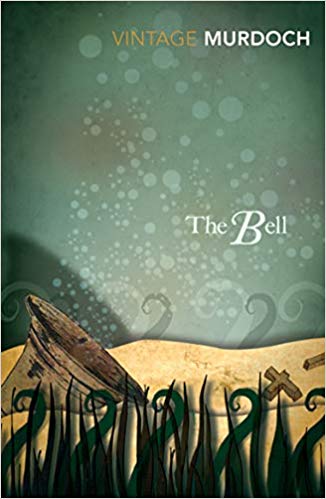Our book group choice for November 2018 is The Bell by Iris Murdoch. A lay community of thoroughly mixed-up people is encamped outside Imber Abbey, home of an enclosed order of nuns.
The Bell is a 1958 novel by Iris Murdoch that explores the themes of spiritual longing, personal identity, and the relationship between the individual and the community. The novel is set in the 1950s in an isolated country house in southwest England, where a small Anglican lay community known as Imber Court has been established. The community is founded by Dora, a wealthy young woman who has been disillusioned by the materialistic world. She hopes that Imber Court will provide a place where people can find spiritual fulfillment and live in harmony with nature.
The community is initially made up of a group of people who are searching for something more in their lives. There is Michael, a former schoolmaster who is struggling with his sexuality; Catherine, a young woman who is considering entering the convent; Toby, a writer who is trying to find inspiration; and Nick, Catherine’s twin brother, who is a troubled and disruptive presence.
The arrival of the new bell at Imber Court disrupts the community’s fragile equilibrium. The bell is a symbol of the spiritual life, but it also represents the weight of the past. The bell was originally cast for Imber Abbey, a nearby convent, but it was never used. The bell’s rediscovery stirs up old memories and conflicts, and it threatens to tear the community apart.
As the novel progresses, the characters are forced to confront their own inner demons. Michael must come to terms with his homosexuality, Catherine must decide whether to follow her heart or her religious calling, and Toby must find a way to balance his creative aspirations with his need for community.
In the end, the bell is returned to Imber Abbey, and the community disbands. However, the characters have all been changed by their experiences at Imber Court. They have learned about themselves and each other, and they have come to a new understanding of the meaning of spiritual life.
Discussion Questions for The Bell
- The Bell was published in 1958 and was immediately popular – did you enjoy it?
- Yearning for the spiritual in a material world, Imber court is a half way house between them. Is Murdoch poking fun at the inhabitants?
- Unreligious Dora is thrown into Imber, how does she contrast with the others and what is the significance of her saving Catherine
- Dora’s relationship with Paul is problematic from the start, what is it’s point to the plot?
- Being homosexual was still criminal when The Bell was published. What’s your view of Murdoch’s portrayal of homosexual love?
- There are lots of doubles – twins/2 sermons/2 confessions) What do the 2 bells represent?
- James’ sermon is about perfection, the observance of moral code. Michael’s about human frailty and moral improvement the goal. Who is the ‘better’ man?
- Bell looks into the short comings of both analytic philosophy (rule bound Imber’s insistence on observably behaviour as the essence of morality) and existentialism (Nick, unruly, self-absorbed, existential man). Which is frailer?
- The Bell is Mudoch’s first book fuelled by Platonism, where good is the substitute for God. Good and any authentic spiritual traditions (including art appreciation) provide ascent – Consider examples?
- Toby is the ‘young innocent’ as he enters the story looking for a pre-college adventure – what effect will Imber have on him?
- James confronts Nick with the story of Toby’s confession, Nick then commits suicide – why?
- Michael is very concerned with his spiritual wellbeing – why is he not able to help Nick?
- When Michael finally gets to speak with the Abbess, she says, ‘All our failures are ultimately failures in Love. Imperfect love must not be condemned and rejected but made perfect. The way is always forward, never back. We can only love by loving.’ What is Murdoch telling us?
- What’s the difference between the symbolism and reality of the nuns in the Bell?
- How are Dora and Michael (together at the end of the book) changed?
- Published and successful in 1958, does the Bell have any resonance today?

